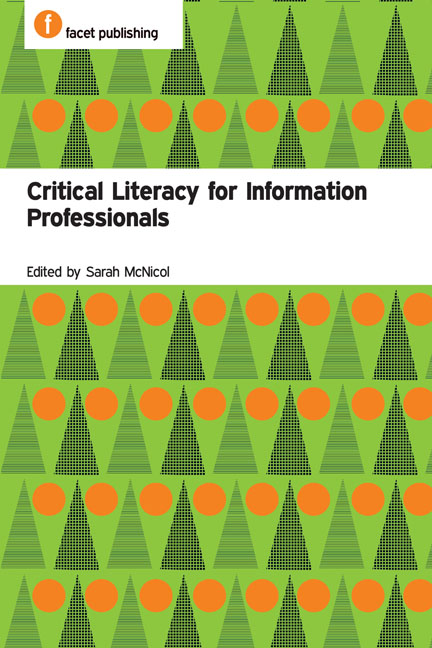Book contents
- Frontmatter
- Contents
- Contributors
- Introduction
- PART 1 THEORIES OF CRITICAL LITERACY
- 1 Renegotiating the place of fiction in libraries through critical literacy
- 2 Death of the author(ity): repositioning students as constructors of meaning in information literacy instruction
- 3 Reading health-education comics critically: challenging power relationships
- 4 Reframing librarians’ approaches to international students’ information literacy through the lens of New Literacy Studies
- 5 Using new literacies to discuss disability in the library
- 6 ‘Anyone can cook’: critical literacy in the workplace
- 7 Social justice, adult learning and critical literacy
- PART 2 CRITICAL LITERACY IN PRACTICE
- Further information
- Index
1 - Renegotiating the place of fiction in libraries through critical literacy
from PART 1 - THEORIES OF CRITICAL LITERACY
Published online by Cambridge University Press: 08 June 2018
- Frontmatter
- Contents
- Contributors
- Introduction
- PART 1 THEORIES OF CRITICAL LITERACY
- 1 Renegotiating the place of fiction in libraries through critical literacy
- 2 Death of the author(ity): repositioning students as constructors of meaning in information literacy instruction
- 3 Reading health-education comics critically: challenging power relationships
- 4 Reframing librarians’ approaches to international students’ information literacy through the lens of New Literacy Studies
- 5 Using new literacies to discuss disability in the library
- 6 ‘Anyone can cook’: critical literacy in the workplace
- 7 Social justice, adult learning and critical literacy
- PART 2 CRITICAL LITERACY IN PRACTICE
- Further information
- Index
Summary
Introduction
As many of the chapters in this book indicate, within librarianship and information studies, critical literacy is usually linked to information literacy and is most often focused on the use of non-fiction texts. Outside libraries, however, critical literacy is commonly explored through various forms of fiction. This chapter considers how, by adopting critical literacy approaches, librarians across all sectors may find opportunities to encourage readers to read fictional texts from a critical stance and thus find new ways to explore the different notions of ‘truth’ presented, as well as widen their range of reading strategies.
The chapter starts by describing how critical literacy forms part of wider literary theory and relates to other approaches to reading. It then describes methods of promoting fiction in libraries in the light of this theory. Finally, it considers the potential of critical literacy in this respect, particularly within reading groups and as part of libraries’ work to promote social inclusion.
Reader response and critical literacy
Critical literacy can be seen as forming part of a wider literary theory that explores different ways in which texts can be read. This section sets critical literacy within the framework of reader response theory, before considering critical forms of reading more specifically.
Reader response theory
Reader response theory is a form of literary theory that focuses on the experiences of the reader and their engagement with a text. It differs from many other forms of literary theory which tend to focus on the form and content of the text, or on the role of the author. For scholars who work within a reader response framework, the reader plays an active role in shaping a text, to the extent that an active reader might be described as a co-author. Rosenblatt's (1994a; 1994b) transactional theory of reading is a key idea in reader response criticism. In this approach, a literary work is conceived not as an object, but as an experience to be shaped by the reader, based on guidance provided by the author through the text. This guidance takes the form of ‘clues’ (Allen, 1988) or reading ‘instructions’ (Iser, 1989).
- Type
- Chapter
- Information
- Critical Literacy for Information Professionals , pp. 3 - 18Publisher: FacetPrint publication year: 2016
- 2
- Cited by



